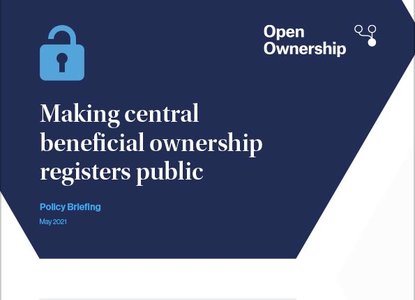We have the right to know

This International Day for Universal Access to Information, Agustina De Luca explains why we have the right to know. Photo: Rodion Kutsaev via Unsplash
At some point in the past 200 years we collectively decided that knowing who owns a company should be a private issue. Who owns the shop on the corner, who owns the company building our house or the business we buy a computer from has become a taboo, meaning we have to search in obscure places or even pay to access that information.
Knowing which people are behind a particular enterprise can help us make better decisions, understand who we are doing business with, and know who controls our government and the powerful entities that run many of the services we rely on every day.
But shedding light on who owns or controls a company (a beneficial owner) can help with bigger challenging issues like fighting corruption, avoiding money laundering, preventing tax evasion, and improving natural resource governance. However, there are many people that make access to beneficial ownership information a secret, complex thing.
On this International Day for Universal Access to Information I, on Open Ownership’s behalf, urge us to make a global call for free, open access to high-quality well-structured beneficial ownership (BO) data. The potential of having global access to data from different jurisdictions of the world on who owns and controls companies is immense and is growing exponentially.
By accessing this transnational data, we could trace illicit financial flows, payments, and repeated modus operandi by companies and people. And even more, if all this data were to be interconnected with unique identifiers, anyone would also be able to easily distinguish any person or company, anywhere. We would be able to know if John Doe in Indonesia is the same John Doe in Guatemala, or if Company A operating in Canada is the same one doing business in Zimbabwe.
Although we are seeing promising efforts (like Nigeria being close to launching its new register, Indonesia making its BO register data publicly available, the UK launching its register of beneficial owners of overseas entities, and new legislation for beneficial ownership transparency (BOT) being discussed in Congress in Chile and South Africa), there’s still a big challenge ahead. Over 100 countries worldwide have committed to BOT, but less than 50% have actually created public central registers.
Data users are finding their way and are accessing data from other sources even where there are no public registers. Recent projects include the case of Colombia, where an organisation identified over 19.000 red flags in the mining licences award process and potential conflicts of interests. Or the Mexico case, where another organisation found that the market to build a new airport for Mexico City was extremely concentrated, with the same five beneficial owners controlling over 70% of the public contracts for the airport. Even more progress has been made in Ghana, where the Procurement Agency’s CEO has been banned from occupying public posts for 10 years after it was demonstrated that he was selling illegal public contracts. Or Slovakia's case, where the former Prime Minister was found responsible for violating the conflicts of interest policy as he had been identified as the beneficial owner of a multinational media agency.
This International Day for Universal Access to Information should help us to collectively think about the challenges ahead for corporate transparency, and to reinforce our commitment for free, open, high-quality, and well structured beneficial ownership data for the public good, to stop corporations from operating in the margins of democracy.
